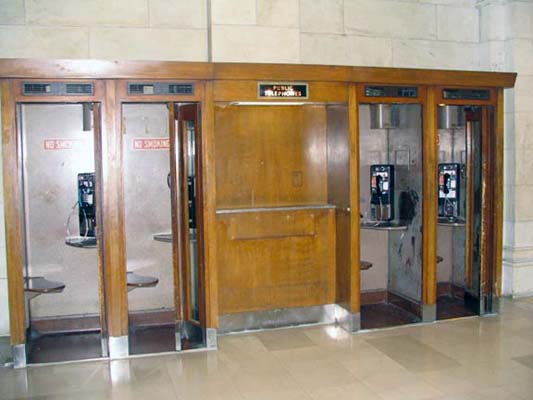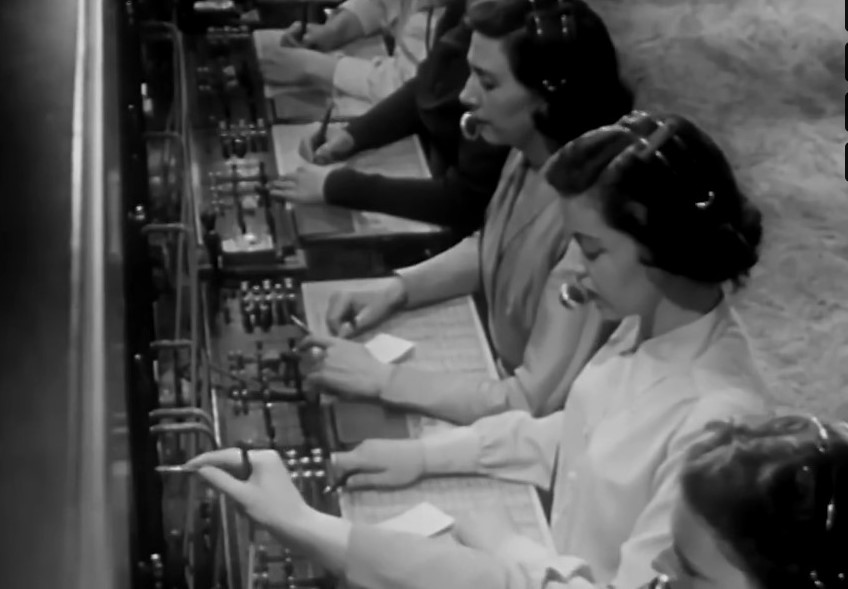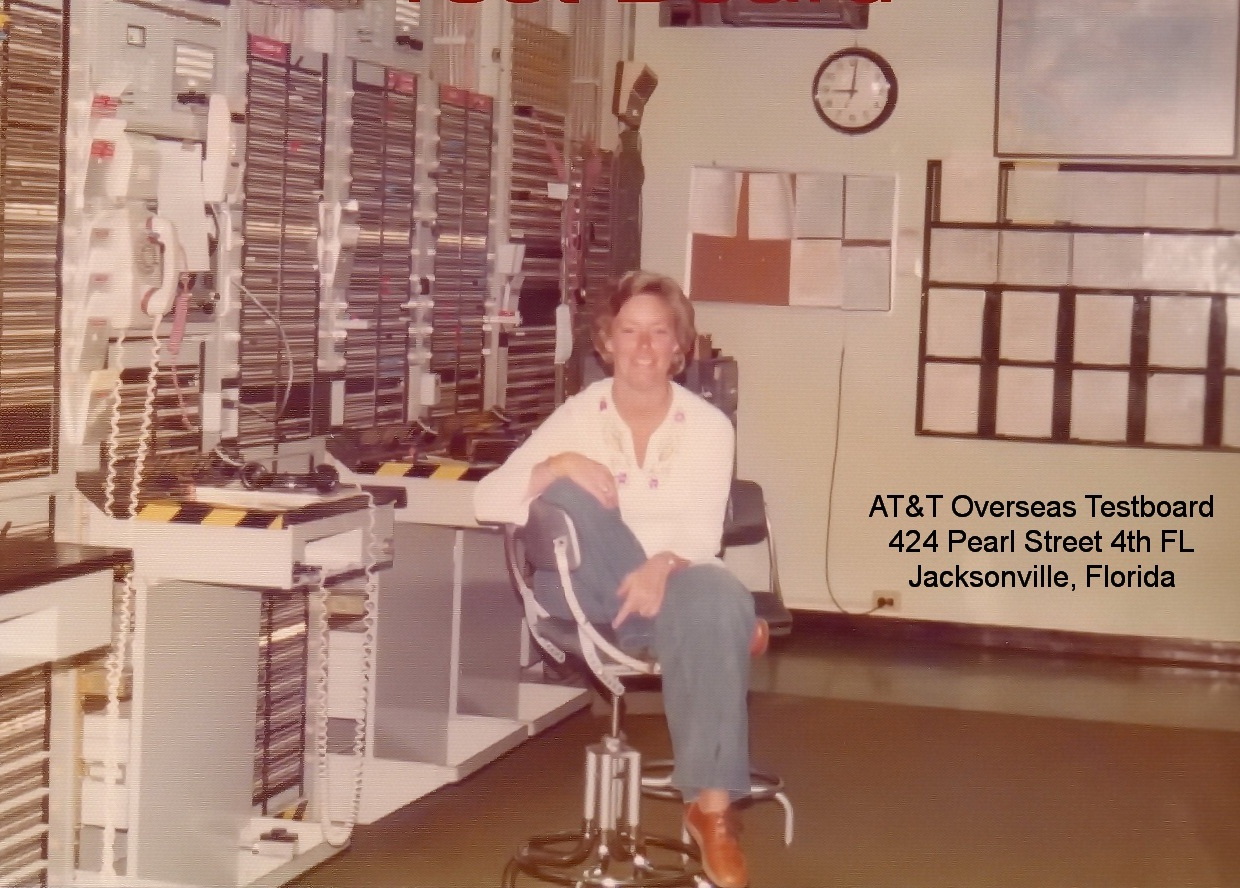I was only eighteen in September 1968, soon to become 19 in December. I had yet to be successful in college and wanted a job with a large company. I had no interest in the telephone company. At my mother’s insistence, I applied for a job as a telephone operator at AT&T Long Lines in Jacksonville, FL, and was less than enthusiastic during my job interview. Two Chief Operators visited my home after that interview, and their primary concern was whether I would have transportation since I did not have my own car. They asked my father for a commitment to ensure I could get to work, and he said without hesitation, “She will be there on time every day. You don’t need to worry about that.”
My career began several weeks later when hired as an Overseas Operator handling calls to the Caribbean and Northern Central America. The address was 3415 Beach Boulevard. My training lasted two weeks, using dummy operating positions guided by a Service Assistant. It was fun and easy, and it paid $68.00 per week. I worked many overtime hours, evenings, and holidays to save for a car. I also worked “split shifts” that were always fun. I would report to work at 10:00 AM and leave at 1:00 PM in the afternoon. I would report again at 8:00 PM and get off at 11:00 PM. Operators worked when the call volumes were heavy and these shifts paid extra money!

1970 Plymouth Barracuda
It took one year to save enough for my first car, a new 1970 Plymouth Barracuda that my father had shopped and haggled for on my behalf. I took out a loan at the credit union for $3,465. I don’t believe either of us thought I would stick with a job at the phone company, much less make it to retirement after 35 years. The only reason AT&T hired me was because of my exemplary high school attendance record and a promise that I would not quit my job to return to college. Instead, they encouraged me to attend college in my off hours and they would pay all of my tuition. That, they did.
The unique thing about this AT&T office was that it was brand new and housed in a beautiful new building. I always had plenty of operator stories to share with everyone. There was a strict dress code requiring dresses – no pants. I loved the foreign operators I would get to know by their voices. No Spanish allowed, and no conversing with the distant operators or customers. The operating room had strict rules, and we were constantly monitored and evaluated. My famous customers included, then famous, newsman Roger Mudd, Random House Publishing founder and TV personality Bennett Cerf, actress Claudette Colbert who owned a home in Barbados, and the infamous Francois Duvalier, Papa Doc, who was “President for Life” of Haiti. Duvalier’s frequent calls to and from the Haitian embassy in Washington, DC, made him a regular caller. He was short in stature but had a deep, dark voice that gave me the chills. He tried to start a conversation with me on one of the three times I caught his calls. Since I was forbidden to talk with him, it was awkward. At that time, he had one of the few telephones in Haiti. Telephone service was handled for everyone else by appointment only using messengers who notified people when to be at the “radio station” where they could receive or initiate an overseas call.

In 1968, the average cost of an overseas call was around $30.00, so customers frequently requested a reminder when three minutes were up. Many people who made overseas calls used pay phones and paid the charges with coins. The coins would fill up a payphone putting it out of service. Counting the dings and dongs of the coins while being deposited was a challenge. Customers would call back the Operator to finish paying for the call, knowing the far end would be charged if someone failed to pay. I thought this was a hoot.

Phone Booths - Hard to imagine today
You must remember that cell phones did not exist, and payphones were available for anyone with a dime. They were in almost all convenience stores, gas stations, and drug stores. The payphones lined up in a row in train and bus stations. They even had a small seat inside the booth. Many times you could find a payphone on a street corner.

AT&T Overseas Operators - It looked exactly like this.
Keying in telephone numbers had to be done using your index finger while holding the pencil in your right hand to avoid a misdialed number. It is possible that no left-handed women were hired. There were no men hired as operators. Men were told that their legs were too long to sit in an operator position and that their fingers were too large to key numbers properly. Really. One had to post a magnetic red circle above your seat when needing to use the restroom. A Service Assistant would find another operator to take over your work position. Even though the rules were strict and rigid, I loved that job. It was fascinating and fun. Each call was challenging to answer all incoming calls within seconds and with no “errors.” You had to be on the ball and work towards better “numbers” on your evaluation. The women who managed the operating room were stern and to be feared. But then I was only nineteen. If I knew then what I know now.
My first promotion to Force Clerk came one year after I was hired. I was given a one-dollar-a-week raise for that promotion. I took on the job of scheduling the hours of the operators and handling the bidding of their different work hours according to their seniority. The women who worked there the longest, had the best hours. After that, I was promoted to Senior Force Clerk doing the same job with more responsibility. I loved my supervisor, JoAnne Paulin, the best person I have ever worked for. She always teased me that I would never make it to “thirty years,” but she entertained us on and off the job. The other clerk I worked with became a close friend, and the two of us were treated to a weekend trip to Atlanta when we turned twenty-one. Our supervisor, who was single, took us to Atlanta to the “Top of the Mart” for dinner one evening and the “Playboy Club” the following night. We stayed with one of her friends who owned a Playboy “key,” and the featured entertainer was a very sultry Lainie Kazan. I remember feeling so grown up. Today, I wouldn’t set foot inside a “Playboy” Club.
In those days, part of a manager’s performance was measured on whether they helped their staff advance to a better position. My supervisor tried her best to help me get a promotion. She sent me to a three-week school in Atlanta to learn FORTRAN. I spent my time at school confused and sick. I completed school with less than flying colors and returned home hungover and exhausted. JoAnn had me taking a barrage of tests for management and other clerical jobs. All of these jobs required passing a typing test. Oh, I could type. I taught myself. Unfortunately, I failed all of the typing tests I attempted. I began to doubt myself to the point that I explored leaving AT&T and going to work at the Jacksonville Sheriff’s Office. I thought I might enjoy working as a policewoman for some reason. At the time, female officers were not driving police cars. They worked with juveniles.
Being at the right place at the right time was a charm I have always possessed. In 1973, unbeknownst to me, the EEOC (Equal Employment Opportunity Commission) fought AT&T and won a landmark sexual discrimination case against the hiring practices I had accepted as normal. Men were never hired as telephone operators because their fingers needed to smaller so they could efficiently and, most importantly, accurately punch telephone numbers at a telephone operator position. “Your legs are too long to fit under the switchboard position” was another excuse AT&T used to reject male applicants in what I believe was the “Best First Job You’ll Ever Have.” Forget the Mcdonalds’ slogan. This litigation outcome resigned AT&T to the fact that it would bring about a change in hiring practices that would allow me to apply for a job previously held only by men.

AT&T Private Line Test Board 1980
I never applied for a technical job. I was “selected” to test for the job. The title was Communications Craftsman. The title morphed from Craftsman to Communications Craft to Communications Technician to Electronic Technician through the years.
You can read all about this in a book titled “THE BELLWOMEN: THE STORY OF THE LANDMARK AT&T SEX DISCRIMINATION CASE” BY MARJORIE A. STOCKFORD. Unfortunately, there is no mention of me in this book, but there should have been.
One thing alone was the key to getting this job that would quadruple my paycheck. There was no typing test required. The men never had to type because they had women there to do it for them. I passed all the necessary tests and interviews, and the next thing you know, I was working in downtown Jacksonville on Pearl Street or Clay Street, depending on which side of the building you were standing on. It was September 7, 1973. I had no idea what to do now. I did not know anything about electronics, telephone equipment, or circuitry. I had never heard words like ohm, schematic, cycles, amplitude, attenuation, bandwidth, CRT, flip-flop, hoot & holler, or POTS (Plain Old Telephone Service).
My job assignment was to run a diagnostic test on an SF (single frequency) unit. If it fails, pack it up and ship it to Western Electric Company for repair. Before I forget, these units were on display at the Smithsonian in Washington, DC, when I visited there in the eighties (that’s how old they are.) Using the massive freight elevator, I picked up the repaired units at the loading dock several times daily, retested them, and placed them in a cabinet. My workspace was the size of the one-stall ladies’ room inside the men’s locker room. It was not air-conditioned, and it had no door whereby any and everyone could pop in to chat. It smelled of WD-40, oil, paint, and cigarettes. I did not handle the job well. I did not have the strength to lift the heavy equipment, push the dolly to and from the loading dock, or un-load equipment off of the truck by myself, much less maneuver the freight elevator while pushing a cart full of equipment.
Following a poor performance review six weeks into the job, my manager said I should consider returning to my old job. I tearfully and unquestionably accepted this and called my old boss. She told me I was crazy. She said these men couldn’t bully me into leaving my new job. They couldn’t fire me; they couldn’t demote me or do anything about anything. She told me that if I sat in a chair doing nothing all day, they couldn’t do anything about that. The only thing they could do was send me to training for my job. Training??? That hadn’t even crossed my mind. She told me to march back into that manager’s office and, without crying, tell him that he would have to send me to school before I quit that job and remind him that this was his only option where I was concerned. She was adamant that I had accepted defeat too soon and not to worry about losing my job. I followed her guidance, and that following Monday morning, I found myself in Atlanta, Georgia, in school.
After three weeks and two trips to the on-sight company doctor for antibiotics and a few tranquilizers (really), I graduated with a passing grade of C. I failed the school. The instructor told me I had it in me to do well, and he wouldn’t fail me. I never let on and set about figuring out how to get out of my grueling isolated equipment packing job and into a department where I could be around others to figure out what this was all about and get the help I needed. When choosing your work hours, you had to bid on your hours according to seniority. I had the seniority to bid on a coveted job in the TVOC (Television Operating Center), working a 4:00 PM to midnight tour by myself. I had no intention of doing this job. Using patch cords, this department manually switched television network feeds from New York and other television network hubs nationwide. The job was the most challenging on the floor because of the precise timing and television network involvement. Patching the network football broadcasts to the local stations, testing these connections, and ultimately doing it on the exact second the broadcast began was not something they would hand over to me. But I had secured the bid for the job, and there was nothing they could do about that. What they DID do to get me to relinquish my bid was to offer me a position in any other department on the floor. I gladly took a job at the OOC (Overseas Operations Center).
This department had a fantastic boss, and accepting co-workers and my familiarity with the overseas countries was a big help. I was also able to use my Spanish. No one else working with me spoke enough Spanish to communicate with the cable and microwave techs working outside the central offices in Central America.

I loved this job and its environment, and I did well. Through the years, I attended many AT&T schools. I enjoyed traveling to Atlanta, White Plains, NY, Albany, NY, Miami, Ft. Lauderdale, and Lyle, Illinois. The trip to Lyle was particularly remarkable since my cousin, Debra, showed me Chicago in the best imaginable way. I also worked in Miami for several months while they relocated their technicians to an another AT&T office. I volunteered to work on the Long Lines Cable Ship (I didn’t get that job) and even won a graphic arts job in an AT&T office in New York City. I decided not to take that job because I didn’t want to leave my parents. So, into the computer revolution, I went. What followed was the manual disconnection and dismantling of every wire and test board on the 4th floor where I worked. I un-wired myself right out of my job.
By now, it is 1983. I have worked at the Overseas Test Board, the 17c Test Board, the Private Line test board, and Circuit Order (Wiring and disconnecting massive data networks belonging to banks, railroads, and other large customers.) I had quite a few ups and down along the way. Hauling the obsolete keypunch machine and card reader to the loading dock was a memorable day. I could again see the writing on the wall. Although AT&T never had layoffs, the rumors were rampant, and I had an opportunity to leave AT&T upon divestiture to work for Southern Bell (BellSouth).
I never forgave my former managers at AT&T for how I was spoken to and how I was treated. So when I got the chance to walk away from AT&T, I and a handful of others left. It was the best move I had ever made. After that, I never again had any problems. Was it the men or just the times? I suppose it was both.
Within three years, my old AT&T office was dismantled and gone. This new job allowed me to walk out of one door into another. I was able to keep my seniority and all of my many benefits. My new title was Toll Test Technician, which later became Testing Technician. The office was at the corner of Emerson Street and Philips Hwy in a newly built two-story building. This job title had me testing all sorts of telephone lines. We installed all of the 911 circuits, cell phone tower circuits, and NASA communications circuits during launches, eavesdropping surveillance lines, and the data networks of banks and large companies. I worked on railroad circuits that switched trains on tracks, radio stations, and telephone lines for presidential visits. We took the trouble reports from the customers, isolated the troubles, dispatched the appropriate inside or outside repair person, and followed the problem through to its ultimate repair or disrepair, which was sometimes the case. It was a great job, in which the day passed quickly. My co-workers were a lot of fun to be around, and best of all, there was no smoking in the new office. Workers today take no-smoking for granted. I endured years and years of a smoke filled workplace. When it was announced that people would no longer be allowed to smoke in offices, I broke into tears.
For five years, I held that job, and once again, rumors of the closing of the Emerson facility were getting louder, and there was the suggestion that this testing office would be relocated to Nashville. The title I held was exclusive to that office and location. In 1989, I decided to apply for the title of Electronics Technician. This title would allow me to make lateral moves in Jacksonville almost endlessly and indefinitely. This job title was held by the people in all of the Central Offices around Jacksonville, and some outside jobs. There were Electronics Technicians assigned exclusively to big customers. I subjected myself to another grueling series of tests, followed by more training here in Jacksonville. Ultimately, I earned another new job, a new title, and more opportunities. That was in 1989. From the window behind my desk on Emerson, I had a clear view of the southern sky where I watched all NASA launches. It was through that window I saw the Challenger explode. I often worked alone at night and on weekends in that building. I was sad to leave some of my best friends behind.
I relocated to a new office in the Southern Bell Tower at 301 West Bay Street. Once again, I was testing and making connections for customers. I was the first point of contact for the customers assigned to me, and it was my job to get them up and running. I drove to work in two active hurricanes and worked from home occasionally. While in this office, I was loaned to a sister office in Columbia, SC, briefly helping them staff their test center while they relocated the office. Along with hundreds of other employees, I received several letters of commendation from customers. Our names were entered in a drawing for an all-expense paid trip for two to the 1996 Summer Olympics in Atlanta. I won one of the trips, and even though it was hot and rainy and the Olympic Park was bombed, Lon and I had a memorable time.
In a few more years, that office was scheduled to close. By this time, I had over thirty years of service and was physically and mentally worn out. I was asked to leave my job and retire. I could take a job in an office called Trunking, and since I wasn’t ready to retire, I went to work managing trunks between central offices. I got the hang of this job surprisingly quickly. It wasn’t easy, but with plenty of notes and help from co-workers, I did well and had fun doing it. My work group was full of old friends and over-the-hill ne’er do wells who eeked themselves into a relatively laid-back job. I hate to say that because it sounds less than stellar, but it was true. The people I worked with and the managers I worked for had been through the same thing. It was a motley crew. I believed I was more devoted to my job than most of my co-workers. It was a fun place to be. I used to attend Jacksonville Symphony concerts during lunch, and my supervisor’s wife was my hairdresser. I was assigned Clay Street, San Marco, Beachwood, San Jose, Loretto, and Gainesville Central Offices. We tested and installed trunks (Circuits) between all combinations of offices. It was while working in Trunking that I began to fall. I ultimately had surgery on my neck at Shands Jacksonville, and against all odds, I returned to work after the surgery. I was working there when my mother and father died and had a lot of flexibility to leave the office on short notice when I needed to help my parents. The nature of the work allowed me some freedom to leave the office for emergencies and their trips to the hospital. After my parents were gone, I struggled to walk and going to work. I fell in the middle of Bay Street in traffic one morning and I’d stand up from my desk and fall. My nerve problems were making it very difficult to sit still. Restless legs tormented me. I decided to retire.
Retiring was a difficult decision that caused me a lot of anxiety. I was used to having plenty of money, and quitting my job was like giving up on myself. I knew everyone else had the same concerns when they stopped working. But, sure enough, my office was soon to close down, and it did precisely that. I was given a choice of taking an incentive to retire or taking a chance. I took the incentive. I took a lump sum instead of a monthly pension for life and another sum that I would have been foolish to turn down. After thirty-four years of working for the phone company, I left the highest-paid non-management job in the company. I had six weeks of vacation each year and nine paid holidays. I learned how to use a computer and had everything I wanted and needed. That was 2004, and I was 55 years old. I wish my parents and my favorite boss had lived to see me retire. They would have been both surprised and so happy for me.
I loved working downtown for most of my career. I enjoyed the restaurants and small shops, which made lunch-hours a combination of exercise and shopping. Christmas time downtown was a treat when all the major department stores were in business, and the small restaurants catered to and knew the downtown workers by name. My all-time favorite lunch spot was a hole in the wall called “Gene’s .” Since Gene’s closed, I have never had a sausage dog or fried chicken as wonderful.
I looked forward to my long-awaited retirement party. The company allotted a good sum of money to help employees celebrate retirement. I was given a BellSouth pendant with seven diamonds, one for every five years I worked. I decided to forego the usual chicken dinner luncheon for the entire floor and treat my immediate work group to a special dinner at The Chart House. We all left work a few minutes early, taking advantage of the restaurant’s “early bird special” and ordering drinks, steaks, and desserts to everyone’s liking. We shared appetizers and side dishes and sampled almost everything the restaurant specialized in. It was great. I loved my idea of dinner away from the office. I had so much fun and two of my co-worker planned the same kind of party, which I also attended. As much money as we tried to spend, we didn’t even come close to the allotted retirement party allowance. It wasn’t for lack of trying. My former office was closed shortly after, and everyone was forced to move or retire.
I am among the luckiest women in the world to have had a good steady job for many years. I never felt that I got that job for anything other than being female. I realized that keeping that job for as long was because I worked hard, sincerely valued my customers, and diligently stayed one step ahead of office closures. Most everyone else didn’t have the nerve or confidence I had to take on a new job with new skills, new co-workers, and change. I excelled at that.

The First Quilt
No comments:
Post a Comment